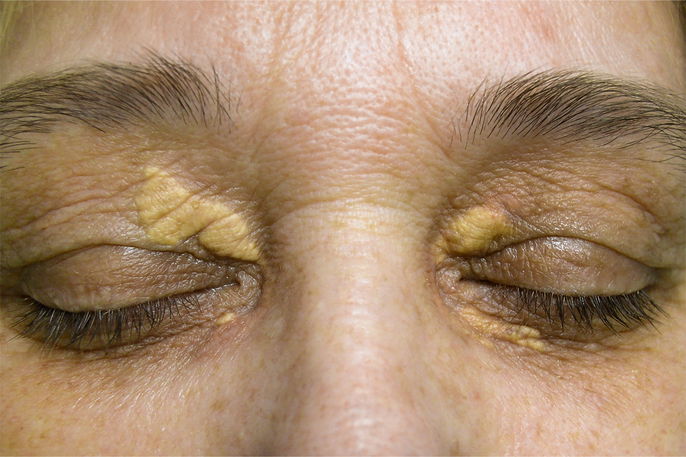Symptoms of high cholesterol generally do not exist and high levels are usually only able to be diagnosed through a blood test. However, excess cholesterol circulating in the blood can lead to fatty deposits in the liver, which can lead to symptoms.
Some people with high cholesterol may experience xanthelasma, which is characterized by small fat deposits on the eyelids, as well as abdominal swelling with no apparent cause. Nonetheless, cholesterol levels need to be very high for symptoms to appear, and most of the time, people are unaware that their cholesterol levels are above normal.
High total cholesterol levels (particularly high LDL levels) together with increased triglyceride levels are associate with an increased risk for cardiovascular diseases, such as atherosclerosis, heart attack or stroke. Therefore, it is important to attend all routine consults so that it is caught early and treates as needed.

Main symptoms
In general, high cholesterol does not cause any symptoms. However, when the cholesterol level are severely high, some symptoms may be noted, such as:
- Lumps of fat on the eyelids, known as xanthelasma;
- Balls of fat in some areas of the skin, known as xanthoma;
- Swelling of the abdomen for no apparent reason;
- Increased sensitivity in the belly area.
Abdominal swelling and sensitivity in this area are usually caused be an enlarged liver or spleen, and occurs when triglyceride blood levels are close to or over 800 mg/dl. These levels may also cause symptoms like intense abdominal pain and frequent nausea.
Because these symptoms will only occur when cholesterol levels are severely elevated, most people do not know when their cholesterol levels are above normal. This allows high cholesterol levels to remain untreated and become more elevated. Learn more about normal cholesterol levels.
How high cholesterol is confirmed
The only reliable way to confirm whether cholesterol is high or not is to complete a blood test. A blood sample can be analyzed in the lab where total cholesterol, "good cholesterol", "bad cholesterol" and triglycerides can be assessed.
You should fast for 12 hours prior to checking cholesterol levels, and you should inform your lab tech whether you fasted or not.
What causes high cholesterol
The main cause of high cholesterol is an unhealthy diet that contains high amounts of fatty foods (like yellow cheese and fried food), and processed foods. These make cholesterol levels increase quickly and are hard for the body to eliminate efficiently.
Lack of physical exercise and poor lifestyle habbits, like smoking and excessive drinking, can also increase your risk for elevated cholesterol levels.
In addition, genetics can play a role in your risk for high cholesterol. Even if you maintain a healthy diet and exercising regularly. you may still have high cholesterol due to a genetic tendency that affects several family members.
Treatment options
The best way to manage high cholesterol levels and avoid medication use is by exercising regularly and maintaining a healthy diet. You diet should be low in fat and consist of plenty of fruit and vegetables. Read more about the low cholesterol diet that your doctor may recommend.
In addition, you can try incorporating some home remedies to help detox the liver and eliminate excess cholesterol. Some options are yerba mate and artichokes.
Also recommended: 8 Natural Ways to Lower Cholesterol (Teas, Juices & More) tuasaude.com/en/natural-ways-to-lower-cholesterolThere are situations in which conservative management is not sufficient in reducing cholesterol, and the doctor may need to prescribe medications like sinvastatin or atorvastatin. These help the body to eliminate cholesterol, and are especially effective in cases of hereditary high cholesterol.
It is important to keep cholesterol levels controlled as high levels can lead to health problems like atherosclerosis, high blood pressure, cardiac insufficiency and infarct. Learn more about how to lower cholesterol levels.






























